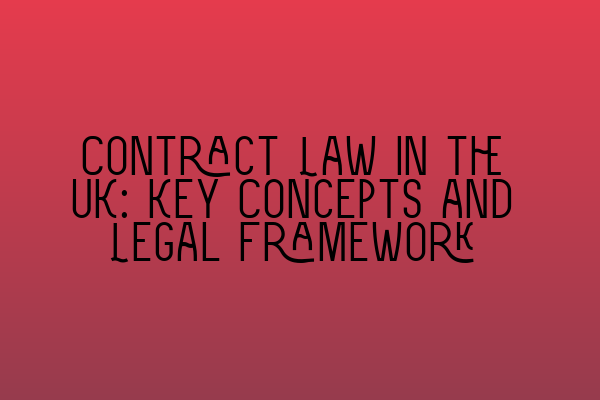Contract Law in the UK: Key Concepts and Legal Framework
Introduction
Contract law is an essential aspect of the legal framework in the UK. It governs the formation, interpretation, and enforcement of contracts between individuals, businesses, and organizations. Understanding the key concepts and legal framework of contract law is crucial for anyone involved in commercial transactions or seeking legal remedies for breach of contract. In this article, we will explore the fundamental principles of contract law in the UK, providing you with a comprehensive overview. Let’s delve into the details!
1. Definition of a contract
A contract is a legally binding agreement between two or more parties. It involves the mutual exchange of promises and the intention to create legal relations. For a contract to be valid, certain elements must be met: offer, acceptance, consideration, intention to create legal relations, and certainty.
2. Offer and acceptance
An offer is a clear and definite proposal made by one party to another. It must be communicated to the offeree, expressing the intention to be bound by its terms once accepted. Acceptance occurs when the offeree agrees to the terms of the offer, creating a binding agreement between the parties.
3. Consideration
Consideration refers to something of value exchanged between the parties to a contract. It can be monetary, goods, services, or a promise to do or refrain from doing something. Consideration is essential to validate a contract, as it ensures both parties are bound to their promises.
4. Intention to create legal relations
For a contract to be legally enforceable, the parties must intend to create legal relations. While commercial agreements usually have the requisite intention, social and domestic arrangements might not. The courts examine the circumstances to determine the parties’ intention.
5. Certainty
Contracts must have certain and definite terms. The agreement should be clear, leaving no room for ambiguity or uncertainty. Vague or incomplete provisions may render a contract unenforceable or open to interpretation.
6. Types of contracts
Contracts can take various forms, including written, oral, or even implied. Written contracts provide a written record of the terms and conditions, creating a higher level of certainty and evidential value. However, oral contracts can also be enforceable if sufficient evidence exists to prove the existence and terms of the agreement.
7. Contractual capacity
Not everyone has the legal capacity to enter into a contract. Minors (individuals under 18 years old) and individuals lacking mental capacity may have limited or no contractual capacity. However, there are exceptions, such as contracts for necessities, that can bind these individuals.
8. Contractual terms
Contractual terms define the rights and obligations of the parties. They can be express terms (explicitly stated) or implied terms (implied by law or custom). Understanding the different types of terms is crucial to interpret and enforce contracts effectively.
9. Breach of contract
When a party fails to fulfill its contractual obligations, it results in a breach of contract. This breach may entitle the innocent party to various remedies, such as damages, specific performance, injunctions, or rescission. The type of remedy depends on the nature and severity of the breach.
10. Legal remedies
Legal remedies aim to compensate the innocent party for the losses suffered due to the breach of contract. Damages, the most common remedy, can be either specific (direct losses) or consequential (indirect losses). Specific performance involves compelling the breaching party to fulfill its obligations, while injunctions prevent the breaching party from taking certain actions. Rescission allows the contract to be canceled and the parties restored to their pre-contractual positions.
Conclusion
Contract law plays a vital role in the legal framework of the UK. Understanding the key concepts and legal principles surrounding contracts is crucial for businesses, individuals, and professionals involved in commercial transactions. By being aware of the elements of a valid contract, the types of contracts, and the remedies available for breach of contract, you can navigate contractual agreements with confidence.
If you’re preparing for the SQE exams, check out our related articles for valuable resources:
– SQE 1 Practice Exam Questions
– SQE 1 Practice Mocks FLK1 FLK2
– SQE 2 Preparation Courses
– SQE 1 Preparation Courses
– SRA SQE Exam Dates
These resources will provide you with additional support and practice to enhance your understanding of contract law and excel in your SQE exams. Good luck with your studies!
